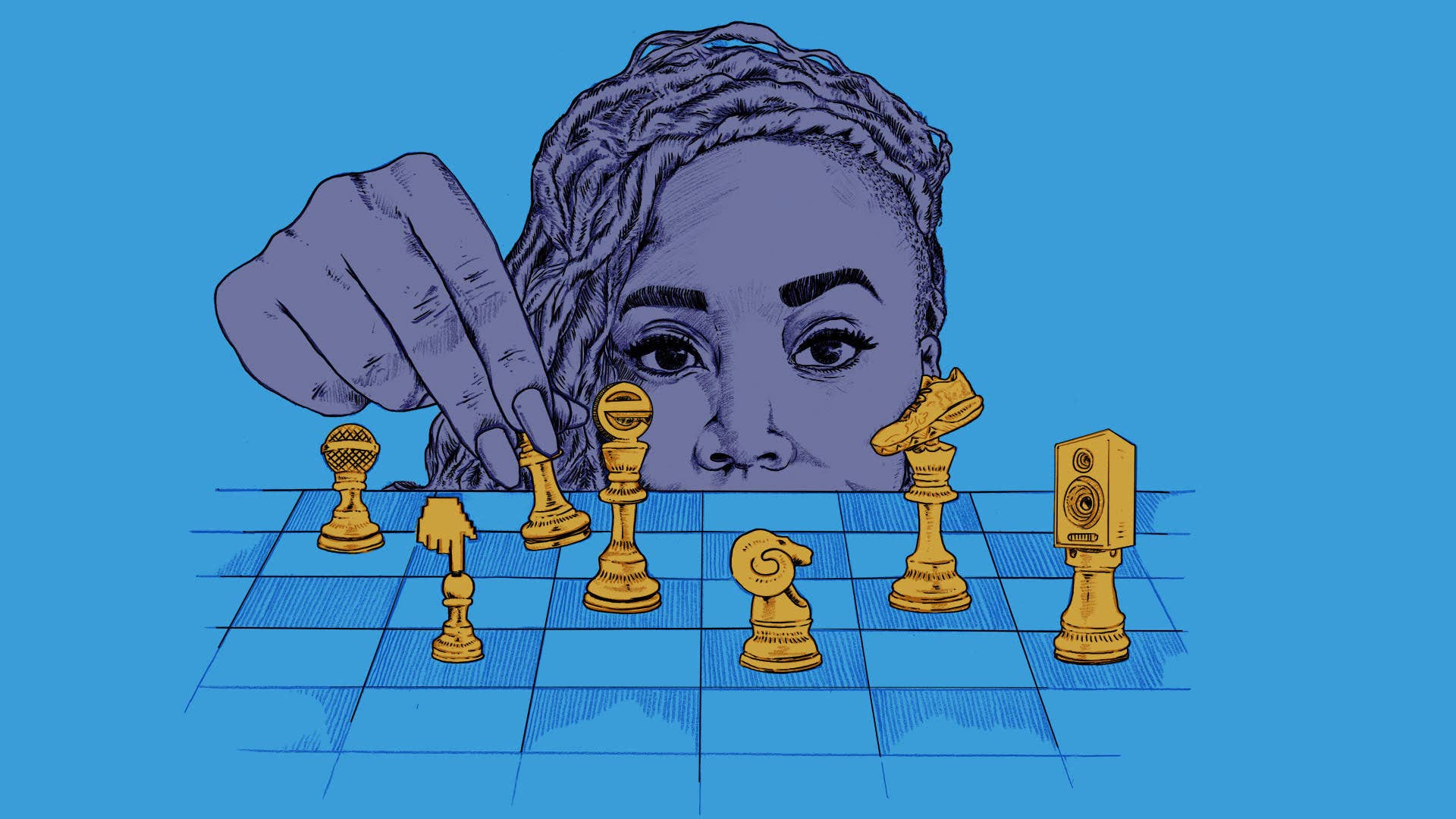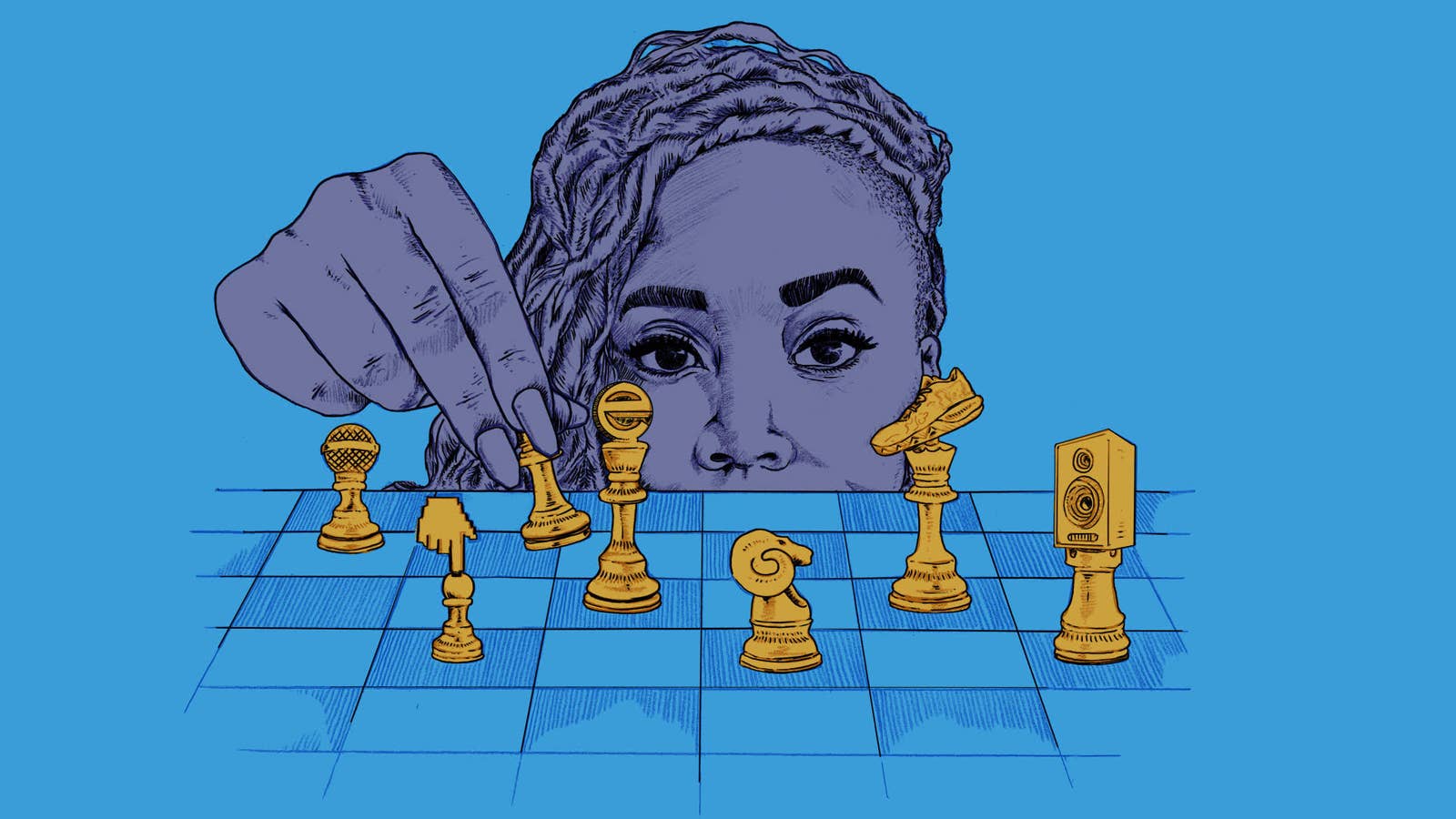
Ebonie Ward isn’t afraid of a little storm. Despite flash flood warnings, she’s fighting through Atlanta’s gridlock on the way to her office at 5Star Productions, where she manages some of rap music’s biggest stars, Future and Gunna included. “I know the weather is awful,” she says coolly over the phone, “but I’m going to make it through.” Hey, you can’t be scared of some rain if your goal is growth.
In less than a decade, Ward has worked her way from music industry outsider to gatekeeper of the most productive crop of rappers and producers in Atlanta. Taking advantage of her down time in transit, the artist manager opens up about the chances she took and the team she relies on to get where she wants to go.
Her story starts with a calculated risk. Ward was an ambitious young woman when she graduated from Albany State University, a HBCU in southern Georgia, and certain she didn’t want a normal nine-to-five. So she devised a way to continue her education while also investing in her greater dreams. Enrolling in a master’s program at Troy University, Ward took out $50,000 in student loans that she then used to help start a boutique men’s clothing store, Fly Kix ATL. “Thank God it all paid for itself, but that was definitely a trying, broke time,” she admits. “I'm not encouraging people to do something like that, but that is my truth.”
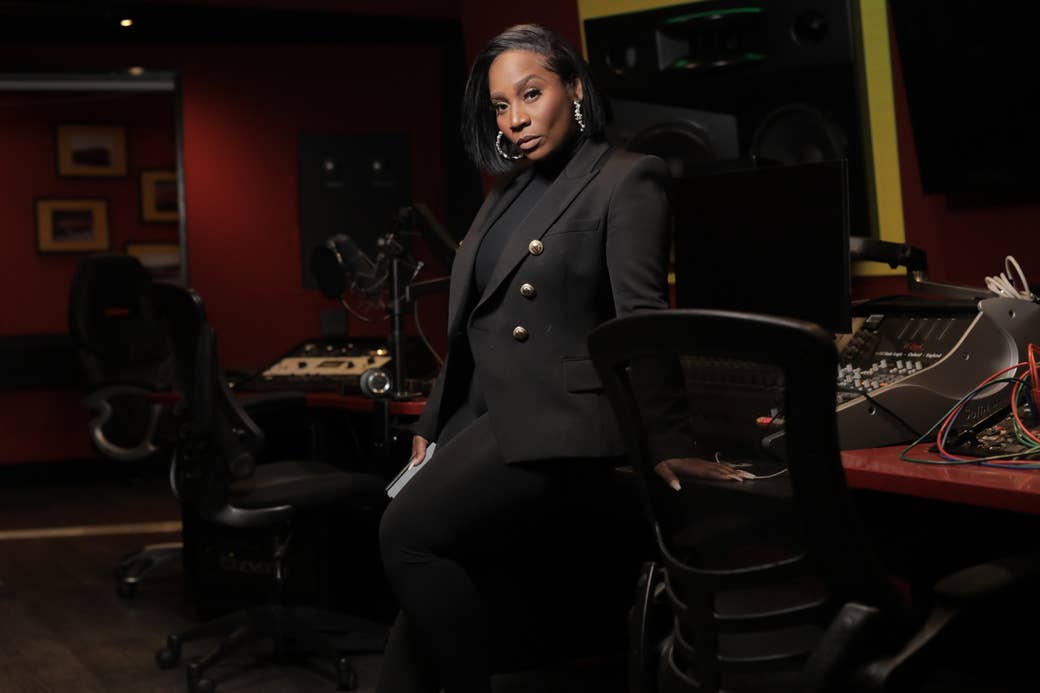
When the boutique opened in early 2011, Ward leaned on her experience planning and promoting concerts during college to ensure its success. She arranged for Georgia rapper Cyhi the Prynce and DJ Don Cannon to play at Fly Kix ATL’s grand opening, did promotions for DJ Drama, and even had a young Kendrick Lamar perform at the store. Fly Kix quickly became a hub for Atlanta’s emerging talent too. Producers Mike Will and Metro Boomin were regulars and Ward became the liaison between artists like them and the brands that wanted their cachet. Fashion, she was finding out, could be a portal to even greater prosperity in the music industry.
It was through the store that Ward first met Future. He was unsigned by a major label at the time, but still had major label tastes. “[Future] always wanted the newest sneakers, the newest apparel,” Ward remembers, “and I had such great relationships with different brands.” Sensing something extraordinary in the rising rapper, she leveraged one of these brand connections to get her and Future to the MAGIC fashion tradeshow in Las Vegas, where he was able to mingle with industry influencers for the first time, which initiated the momentum of his—and her—eventual stardom.
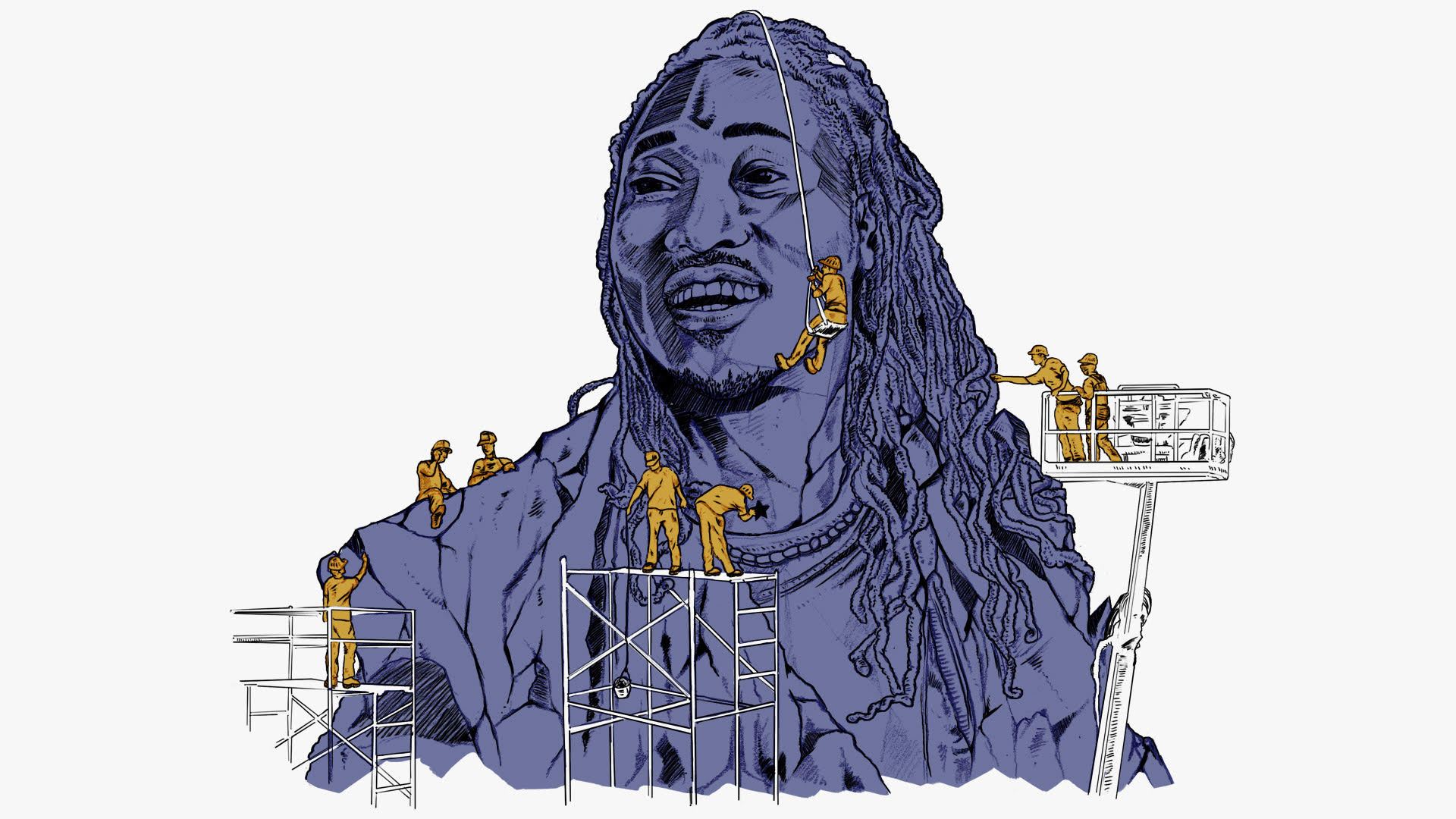
“In management, you have to be an effective leader, but you come to the realization that your dreams lie in someone else's gifts and capabilities, so their dreams become your dreams.”
Success in this new industry didn’t come overnight for Ward though. She officially started off as Future’s assistant, a transition that wasn’t easy for the woman who had always been her own boss. “It was an extremely humbling experience,” she remembers. “Even though I was connected and I had great relationships, it was a completely different business structure to what I was doing previously.” She found a mentor in Anthony Saleh, who she'd soon join as a partner at his management company Emagen. “He was always extremely encouraging,” she continues, “willing to teach and allowing me to understand what it means to be teachable.”
With Saleh’s company, Ward developed her team of artists and collaborators out of the connections she’d been forging during her years hustling in the fashion world. If someone can build a good website for a clothing boutique, they can do the same for a music artist, Ward says. And the same is true with product development and logistics. The real value comes in recognizing what others can bring to the table and encouraging them to do their best for the betterment of all. “In management, you have to be an effective leader,” she says, “but you come to the realization that your dreams lie in someone else's gifts and capabilities, so their dreams become your dreams.”
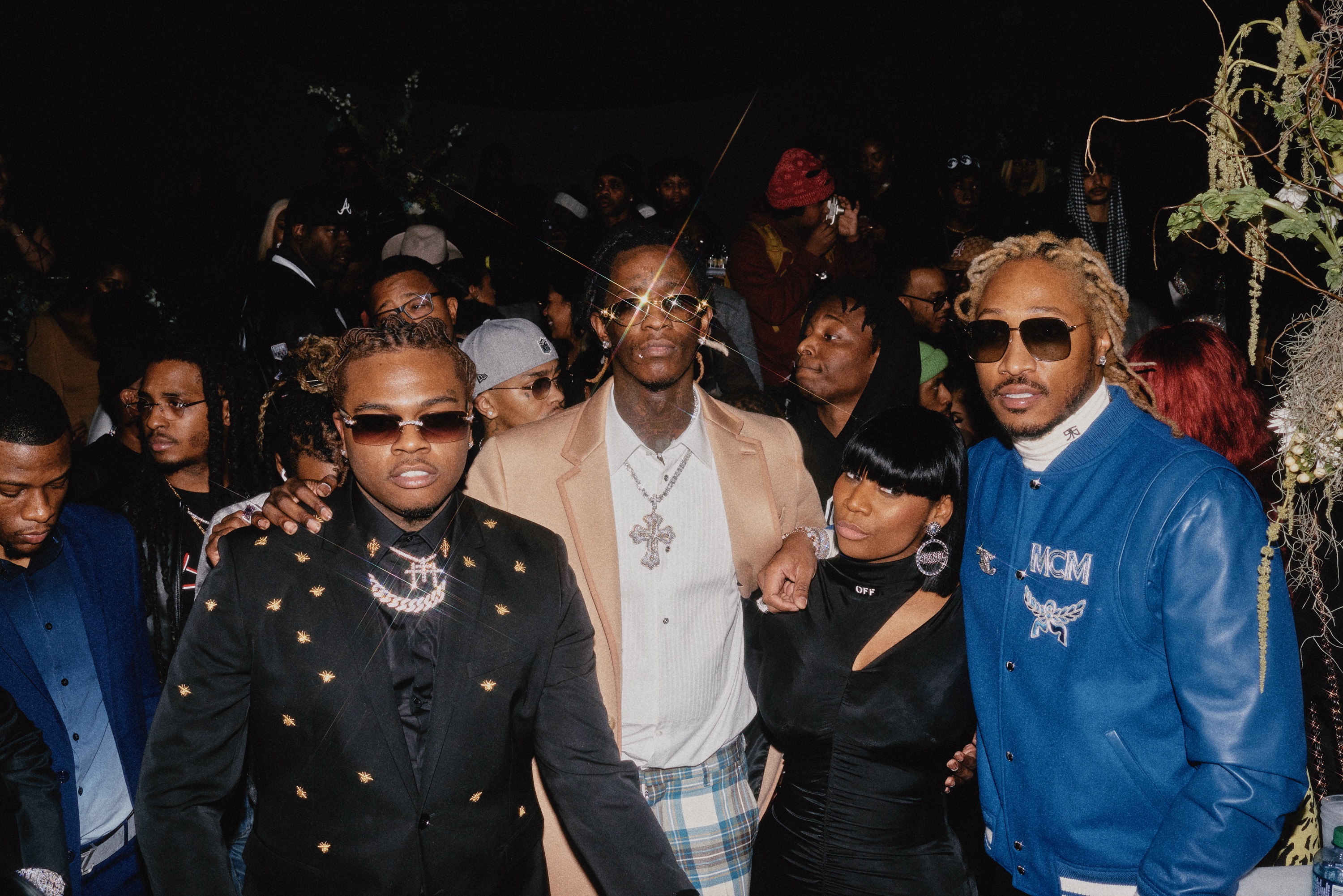
“We’re more like family than work colleagues and we have such a mutual respect for each other’s gifts and talents.”
Now, Ward leads a close-knit squad at Emagen. “I have a team of eight people who I work with,” she explains. That group includes everyone from an in-house digital marketer and an A&R to a brand manager and travel coordinator. Together, they oversee the careers of Future and Gunna, as well as artist and photographer Hidji World, Spike Jordan of The Genius Club, Grammy-nominated super producer Turbo and his Playmakers collective, and all the Freebandz artists. It’s a dizzying web of responsibilities to coordinate, but Ward manages a symbiosis amongst the many roles. “We’re more like family than work colleagues and we have such a mutual respect for each other’s gifts and talents,” she says. “We’re creating our own little ‘compound,’ where we’re literally together more than we’re with our families.”
That kind of closeness makes communication flow smoothly. “We created this work environment where it’s so comfortable and we’re so used to being around each other, the communication is always so fluid,” says Ward. “When you’re around people so much, you don’t miss a beat. You start to operate on the same wave, the same thinking pattern. I can definitely say that's been a part of my group's biggest strengths.”
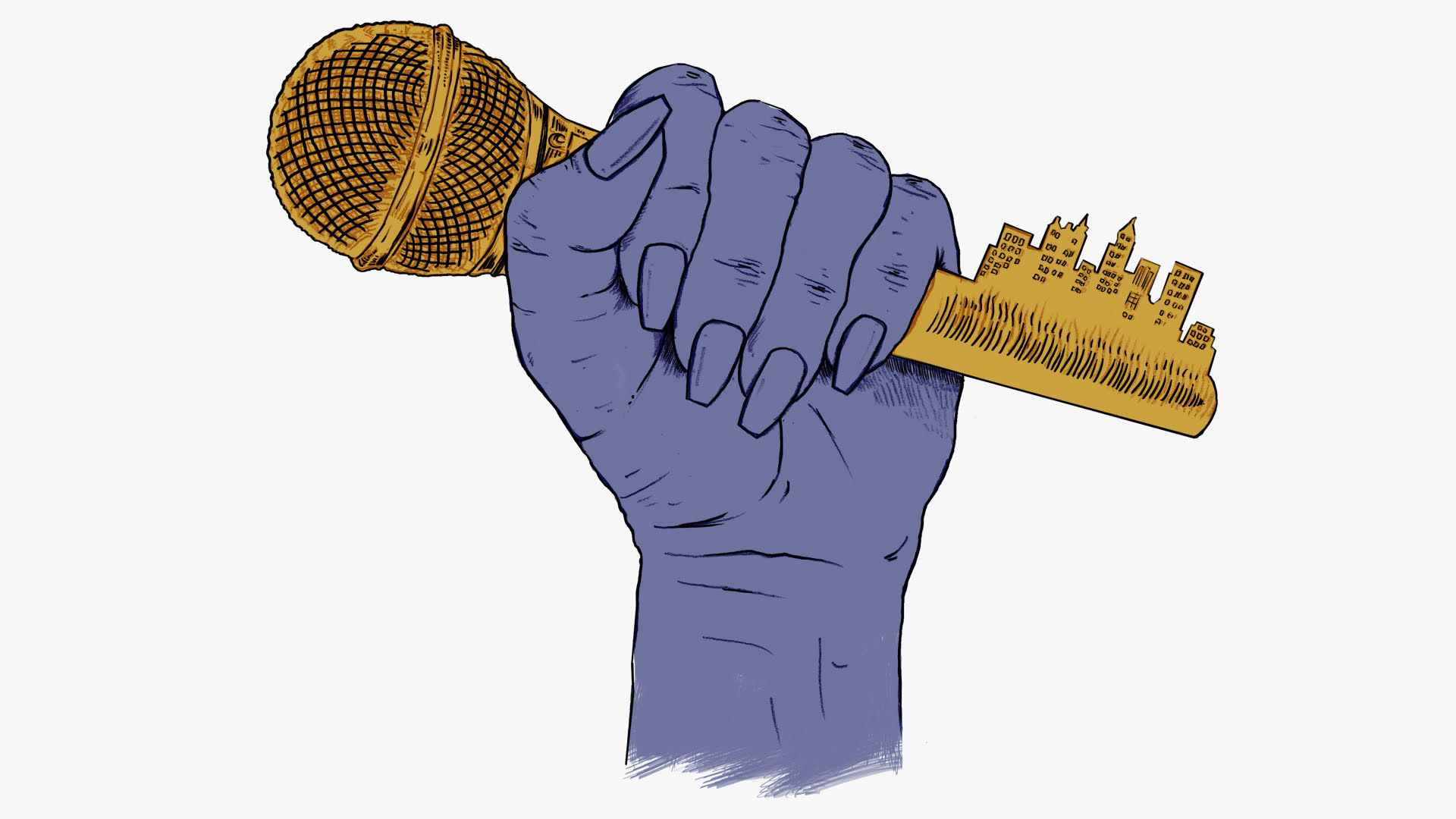
“We’re creating our own little ‘compound,’ where we’re literally together more than we’re with our families.”
To foster this family atmosphere, Ward embeds herself in her artists’ lives. “Some managers use strategy, or numbers, or phone calls,” she says, “but I can’t properly tell you that you can put your career in my hands if I’m not with you. I want to be part of the bottom of it. If you’re falling asleep in the studio then I’m going to be falling asleep in the studio.” She remembers the early days touring with Future in an old white van, waiting outside the club for hours to find out whether the fire marshals were going to shut the show down. And more recently, watching late nights turn to early mornings in the studio as Gunna and Turbo worked on Drip Harder and Drip or Drown 2. “Those are moments that I'll never forget for the rest of my life. And that's created a binding relationship forever.”
The confidence Ward’s artists have in her perspective has allowed her to have a unique influence on shaping their respective sounds. “There was a point in time [Future] never wanted to sing melodies,” she confides. “He thought he needed only to be a street artist.” That perspective changed after Future recorded “Loveeeeeee Song” for Rhianna and “Turn on the Lights,” two early tracks that showed off his melodic crooning. Ward was present at both of those sessions and expressed the idea to Future that he should sing more. “We kept telling him that the world should hear his voice and not hold back on that,” she recalls. Trusting Ward’s intuition as well as his own, Future met her in the middle. “I’ll give them both sides of me,” Ward remembers him telling her, “How can we deliver it to my fans where they’ll be appreciated?”

The answer was FUTURE and HNDRXX, a pair of albums Future released in February 2017 that showcased both sides of the trapper-turned-troubadour. Each project was an instant critical and commercial success. With an assured push from his long-time manager, Future found himself as the first artist to release two Billboard 200 chart topping albums in consecutive weeks. “When you have real trust… and that person believes in their heart that you have their best interests at heart, they're more willing to go big,” Ward explains. “They understand that you're in it with them. Whether they fail or succeed, we fail or succeed together.”
Creating success in the fast-changing music industry depends on your ability to stay on top of all the new ways music is shared, which is why Ward stresses the importance of investing early in young talent, both in music and business. “I’m not in school anymore, but I’m learning,” she affirms. “It’s how I stay grounded.” And though she isn’t on TikTok or Twitter, Ward understands the importance of tuning into each platform’s possibilities, and makes sure to surround herself with young people who can effectively communicate through those channels. For Ward, she sees innovation as opportunity. “Some people kind of run away from that challenge and like to deal with things they've already established, but I like this birth of a new age,” she says. “It's like I have a brand new child and we can explore the world together. A new set of eyes, with new ears, ready to receive new things.”
The rain hasn’t let up since Ward hopped on the phone over an hour ago, but she has other work to do regardless. Future’s latest single, a duo with Drake called “Life is Good,” has just gone platinum, and she’s trying to make the title’s mantra into a movement. “It’s a difficult time right now,” she says, “with so much going on in the world… people are hurting.” Can a song change that? “It’s a mindset,” Ward adds, “if people start just saying ['Life is Good']… people just start changing. And more than anything, that’s what we’re advocating.”

